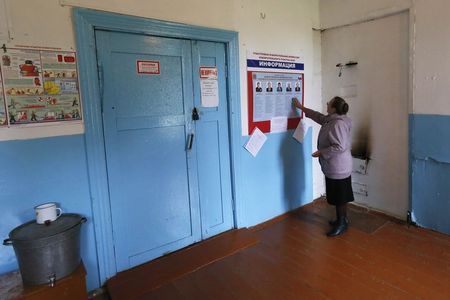By Maria Tsvetkova
MOSCOW (Reuters) - The ruling United Russia party and state-backed candidates won decisive victories in Russian regional elections at the weekend in what Kremlin critics said was the result of vote-rigging and a stifling political climate.
Of 85 regional governors, the 29 who were up for re-election on Sunday were either members of the ruling party or backed by the Kremlin. All won their races easily, with more than half getting more than 80 percent of the vote, according to the central election commission.
United Russia is loyal to President Vladimir Putin. According to a popular opposition slogan coined by blogger Alexei Navalny, it is made up of "crooks and thieves".
Elections to local parliaments in 84 of the 85 regions also handed victory to mainly pro-Kremlin politicians.
"The current political system does not allow electoral victory for honest independent candidates," Navalny, who is under house arrest, wrote in a note posted on his website after Sunday's vote.
Navalny, who rose to prominence as an anti-corruption campaigner, led street protests that shook the Kremlin in 2011 and 2012, marring Putin's return for a third term ruling Russia.
Since then, Putin has tightened the Kremlin's grip on the electoral system, making it harder for opposition candidates to mount a serious challenge to state-backed politicians.
Vote-rigging contributed to Sunday's results, electoral rights expert Alexander Kynev said in an article on Internet news site slon.ru.
"Where they needed turnout to be higher, they didn't hold back from outright fraud, (such as) 'cruise voting' or rigging via home votes," he said.
The central election commission said no serious electoral irregularities had taken place on Sunday. Independent vote monitor Golos posted a map of about 800 electoral violations it said it had recorded across Russia.
In Moscow, where Navalny gave an unexpectedly strong showing in mayoral elections last year, United Russia or state-backed candidates won 38 of 45 seats in the local government.
But turnout hit an all-time low in the capital. Only 21 percent cast a vote, the lowest in 25 years, according to local news agencies.
On the Crimea peninsula, residents cast their first votes in a Russian election since annexation from Ukraine in March.
The head of the new Communist Party of Social Justice, Andrei Brezhnev, grandson of Soviet leader Leonid Brezhnev, compared the dominance of United Russia in local elections to the Soviet political landscape.
"About two months ago everybody, wholesale, was forced to 'voluntarily' sign up for membership in United Russia here -- officials, heads of local administrations, shop directors, medical workers," he said.

"Suddenly, in three months, everything became United Russia."
(Writing by Alessandra Prentice; Editing by Janet Lawrence)
